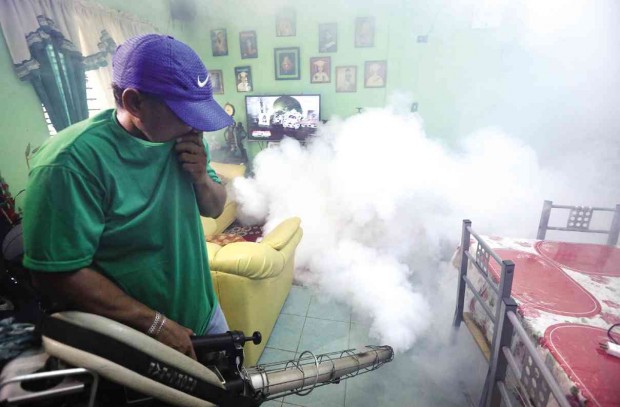C. Luzon students to get dengue vaccines in March

ONE OF THE most common ways local governments fight dengue is through fogging, which experts say is among the least effective methods of dealing with the mosquito-borne disease. The advent of a vaccine against dengue is offering hope, though. MARIANNE BERMUDEZ
CITY OF SAN FERNANDO—The world’s first vaccine against the mosquito-borne dengue virus will be introduced in March to students in Central Luzon, which recorded last year 35,966 dengue cases, the highest among 17 regions, a Department of Health (DOH) official said on Monday.
The pilot test of the vaccine Dengvaxia is going to be undertaken simultaneously here and in Metro Manila and Calabarzon (Cavite, Laguna, Batangas, Rizal and Quezon), where a high number of dengue cases was noted in 2015, said Dr. Jessie Fantone, head of the DOH epidemiological unit in Central Luzon.
The vaccine, made by the French pharmaceutical company Sanofi, will be put to use after it underwent a five-year clinical trial period, Fantone said.
Grade 4 pupils enrolled in public schools in the region will receive regular injections of the vaccine for 12 months, regardless of whether they were infected with one or four strains of the virus, he said.
He said he expects the pupils to experience minimal side effects such as infection, dizziness or allergies.
Last year, dengue had infected 108,263 Filipinos and left more than 300 deaths nationwide. In Central Luzon, dengue killed 47, which was far fewer than the 111 deaths from dengue in Metro Manila.
According to the DOH, the government has been spending P16 billion a year to combat dengue.
As of Jan. 16, the DOH recorded 766 dengue cases in Central Luzon, which was 2 percent lower than the 778 cases treated in the same period in 2015. Pampanga has the most cases at 237. No fatalities have been reported.
The Philippines participated in a 20-year dengue vaccine trial, Health Secretary Janette Garin said in a Jan. 4 statement.
“The fact that the three phases of the clinical trial [was] concluded in the Philippines is a reflection of the efficiency and capability of Filipino researchers. This shows that the world recognizes Philippine expertise in the area of research,” Garin said.
Former health secretary Enrique Ona had said that the study on the dengue vaccine efficacy was conducted in five Asian countries, including the Philippines.
At least 3,500 children in Cebu and San Pablo cities were given the vaccine for testing.
Among 10,275 children, more than half of the subjects did not get dengue infections compared to the group that did not receive the vaccine, Ona said.
The study also showed that after three doses, the vaccine reduced the possibility of developing dengue hemorrhagic fever by 88.5 percent, based on World Health Organization criteria.
There was a 67-percent drop in the risk of hospitalization due to dengue during the observation period.
The Philippines established the National Dengue Prevention and Control Program in 1993, which states that on the average, 220 Filipinos got infected by the virus daily between 2011 and 2015.
A study in 2014 shows that the average cost of treatment per patient was P18,405 or a total of P16 billion a year for all cases. According to the DOH, the amount excludes the patient’s expenses for transportation and food, and the value of money lost due to work absences, lost productivity and premature deaths.
Garin cited a study by professor Hilton Lam, of the University of the Philippines-National Institute of Health, which states that a nationwide annual routine vaccination of 9-year-old children starting in 2016 could lead to an estimated 24.2-percent reduction in the number of dengue cases over a 5-year period.
This would translate to 775,053 cases which have been avoided, 502,000 people who would no longer require hospitalization, 22,010 people who did not die due to the ailment and almost P21 billion in “avoided cost to society.”
Garin said the DOH is going to use proceeds of the sin tax to pay for the vaccine. Tonette Orejas, Inquirer Central Luzon














